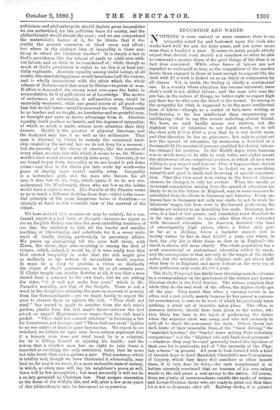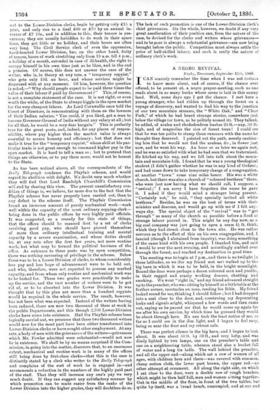EDUCATION AND WAGES.
NOTHING is more natural or more common than to see sympathy asked for and bestowed upon the clerk who works hard with his pen for forty years, and yet never earns more than a hundred a year. It seems to many people utterly unjust that clerical work should not somehow or other be able to command a greater share of the good things of life than it in fact does command. While other forms of labour are not regarded as underpaid so long as the competition of the market leaves those engaged in them at least enough to support life, the clerk with 2-2 a week is looked on as an object of compassion by all classes. Yet, in truth, the feeling is chiefly a sentimental one. In a country where education has become universal, mere clerk's work is not skilled labour ; and the man who uses the pen has, in the nature of things, no better right to expect high pay than has he who uses the chisel or the trowel. So strong is the sympathy for what is supposed to be the more intellectual form of labour—though, as a matter of fact, mere writing or book-keeping is far less intellectual than carpentering or bricklaying—that to say this sounds unfeeling, almost brutal. We have, we need hardly assure our readers, not the slightest wish or intention to use harsh words, or to tell the clerk with 2'50 or £100 a year that he is not worth more, and that therefore he has no grievance ; but only to point out how the spread of education, by increasing a hundred or a thousandfold the number of persons qualified for clerical labour, has changed his position. In the Middle Ages, when learning was so much rarer, to be able to read, write, and cipher meant the attainment of an exceptional position, to which all men were willing to pay respect and honour. Thus it happens that clerical labour has come by tradition to be looked on as something valuable and good in itself, and deserving of special considera- tion. That this view must now, owing to the force of circum- stances, be changed, is only too evident. What the results of increased competition arising from the spread of education are likely to be in the future in England, may in some measure be calculated from its effects in Germany and America. Every one knows how in Germany not only can clerks be got to work for labourers' wages, but how, even in the learned professions, the salaries are reduced to an incredibly low scale. Germany, how- ever, is a land of low prices ; and something must therefore be in its case attributed to causes other than those connected with increased education. In America, however—the land of extravagantly high prices, where a dollar only goes as far as a shilling, where a bachelor cannot mix in society unless he has at least £1,000 a year, and where, in fact, the city life is three times as dear as in England—the result is shown still more clearly. The whole population has a good commercial or professional education within its reach, and the consequence is that not only do the wages of the clerks suffer, but the ministers of the religious sects get about half what they do in England, and many doctors at the very top of their profession only make £1,500 a year.
The Daily Telegraph has lately been throwing open its columns to a correspondence on the grievances of the writers and Lower- Division clerks in the Civil Service. The writers complain that while they do the real work of the offices, the higher clerks get all the pay. They assert that when a vacancy occurs in an office, and a raw youth, merely because he has passed a success- ful examination, is sent to do work of which he previously knew nothing, a great act of injustice takes place. The office, in common fairness, should have been given to the writer, who very likely has been in the habit of performing the duties when the superior clerk was away, and who will certainly be told off to teach the new-comer his work. Others throw out dark hints of their miserable lives, of the "bard driving," the "snatched lunches," the "fearful oases arising from sedentary occupations," and the " blighted wife and bank-book prospects " —whatever they may be—and generally bewail the injustice of their own lot in particular, and of " the enormity of the Play- fair scheme " in general. All seem to look forward with a kind of feverish hope to Lord Randolph Churchill's new Commission of Inquiry, which they fancy will somehow or other benefit them, if it only does its duty,—for each complainant is at bottom sincerely convinced that an increase of his own salary would in the end prove a real saving to the nation. Of course, there are plenty of correspondents outside the ranks of writers and Lower-Division clerks who are ready to point out that their lot is not so desperate after all. Railway clerks, it is pointed
out to the Lower-Division clerks, begin by getting only £15 a year, and only rise to a final £60 or £70 by an annual in- crease of £7 10s., and in addition to this, their tenure is pre- carious; they are usually forbidden to do work in their spare time, they get little or no holiday, and their hours are often very long. The Civil Service clerk of even the oppressive, hard-hearted Lower Division, has, on the other hand, fixity of tenure, hours of work stretching only from 10 a.m. till 4 p.m., a holiday of a month, extended in case of ill-health, the right to occupy himself in his own time just as he likes, and in the end a pension. Of course, this does not answer the case of the writer, who is, in theory at any rate, a " temporary copyist," who gets only 10d. an hour, and whose services might be dispensed with at any moment. Of him, however, the question is asked,—" Why should people expect to be paid three times the value of their labour if paid by Government ?" This, of coarse, is not a complete statement of the case. It is not right, or even worth the while, of the State to always Niggle in the open market for the very cheapest labour. As Lord Cornwallis once told the Court of Directors, in remonstrating with them on the lowness of their Indian salaries, " You could, if you liked, get a man to become Governor-General of India without any salary at all ; but for all that he would be a very dear bargain." This is perfectly true for the great posts, and, indeed, for any places of respon- sibility, where pay higher than the market value is always essential to secure honesty and efficiency ; but that does not make it true for the " temporary copyist," whose skill at his par- ticular trade is not great enough to command higher pay in the open market. It is hard to tell a man so ; but to pretend that things are otherwise, or to pay them more, would not be honest to the State.
As has been noticed above, all the correspondents of the Daily Telegraph condemn the Playfair scheme, and would regard its abolition with delight. We doubt very much whether they will find that Lord Randolph Churchill's Commission will end by sharing this view. The present unsatisfactory con- dition of things is, we believe, far more due to the fact that the Playfair scheme has never properly been carried oat, than to any defect in the scheme itself. The Playfair Commission found an immense amount of purely mechanical work—work well within the capacity of the most ordinary copying-clerk- being done in the public offices by very highly paid officials. It was suggested, as a remedy for this state of things, that the offices should be manned first by a set of clerks receiving good pay, who should have proved themselves of more than ordinary intellectual training and mental capacity by a severe examination, and whose duties should be, at any rate after the first few years, not mere routine work, but what may be termed the political business of the office. As entrance to these posts was by open competition, there was nothing savouring of privilege in the scheme. Below these was to be a Lower Division of clerks, to whom considerably less pay and less hope of advancement were to be held out, and who, therefore, were not expected to possess any marked capacity, and from whom only routine and mechanical work was to be looked for. These two grades were practically to make up the service, and the vast number of writers were to be got rid of, or to be absorbed into the Lower Division. It was thought that by this plan not more than a hundred copyists would be required in the whole service. The result, however, has not been what was expected. Instead of the writers having been reduced, there are now two thousand of them at work in the public Departments, and this though 2.700 Lower-Division clerks have come into existence. Had the Playfair scheme been logically carried out, we presume that these two thousand writers would now for the most part have been either transformed into Lower-Division clerks or have sought other employment. At any rate, a body of men with the grievances of the writers—grievances which Mr. Fowler admitted were substantial—would not now be in existence. We shall be by no means surprised if the Com- mission, in going into the matter, discovers that, to an enormous extent, mechanical and routine work is in many of the offices still being done by first-class clerks—that this is the case is distinctly stated by a clerk who writes to the Daily Telegraph and complains of the sort of work be is engaged in—and recommends a redaction in the numbers of the highly paid part of the staff. That they will increase any one's pay we very much doubt. If they can suggest any satisfactory manner by which promotion can be made easier from the ranks of the Lower Division into the higher grades, they will doubtless do so. The lack of such promotion is one of the Lower-Division clerk's chief grievances. On the whole, however, we doubt if any very great amelioration of their position can, from the nature of the case, be devised for the clerks and writers whose grievances— and to be poor is always a substantial grievance—are now being brought before the public. Competition must always settle the price of half-skilled labour, and such is really the nature of ordinary clerk's work.



































 Previous page
Previous page